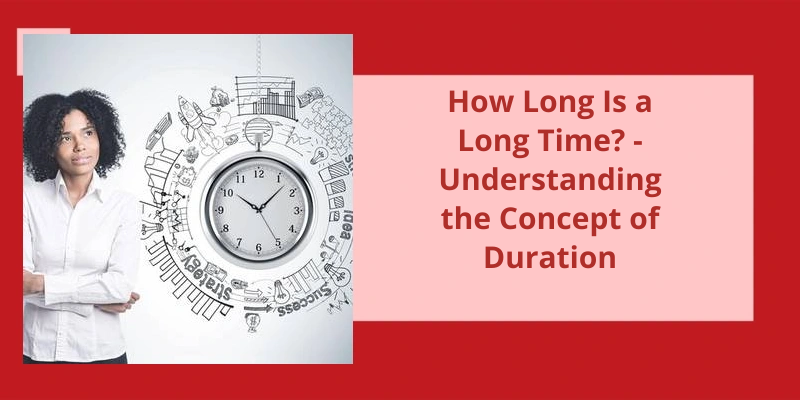A “long time” is a concept that’s inherently subjective, as it can vary greatly depending on the context in which it’s used. It’s a phrase that’s often employed to describe a duration of time that’s passed, but the specific length of that period can differ from person to person. While some may consider a few minutes to be a long time in certain circumstances, others may view days, years, or even centuries as necessary to qualify as a significant passage of time. The ambiguity of this term allows for a wide range of interpretations, whether it be the span of a lifetime, the existence of a civilization, or the evolution of the universe itself.
How Long Is the Meaning of Long Time?
When we talk about a “long time,” we’re referring to a period that extends beyond what’s considered short or immediate. The concept of duration is subjective and can vary depending on the context and the individuals involved. In English, the phrase “long-time” is commonly used to describe someone who’s held a position or been associated with a particular group for an extended period. For example, a “long-time friend” implies a deep and enduring bond that’s stood the test of time.
In the English language, the term “long-time” is often used in the context of loyalty or commitment. It emphasizes the duration and reliability of a persons support or affiliation. A “long-time supporter” suggests unwavering dedication and steadfast belief in a cause, political party, or individual.
The phrase “long-time” can also be used to describe familial relationships. When someone is referred to as a “long-time friend of the family,” it implies that they’ve been an integral part of the familys life for a considerable period. This designation underscores the depth and longevity of their involvement with the family unit.
For a long time, linguists and grammar enthusiasts have pondered over the classification of the term “a long time.” It’s been widely accepted that this phrase acts as an adverb, specifically an adverbial phrase, used to convey a duration of time without specifying the exact length. Thus, it’s safe to say that “a long time” or “for a long time” functions as an adverb, adding depth to our understanding of temporal expressions in the English language.
What Part of Speech Is for a Long Time?
In the English language, the phrase “for a long time” acts as an adverbial phrase. It functions to express a duration of time, without specifying the exact length. As an adverbial phrase, it modifies the verb in a sentence, providing additional information about the action being performed.
It implies that a particular action or condition has been occurring or will continue to occur for an extended period. The phrase suggests the passage of a substantial amount of time, without specifying the exact duration in question.
For example, in the sentence “The old man sat on the porch for a long time,” the phrase “for a long time” modifies the verb “sat,” indicating that the man remained seated on the porch for an extended duration without specifying the exact length. The phrase adds depth and context to the action, conveying the idea that the man spent a significant amount of time in that position.
Similarly, in the sentence “She’s been studying for a long time,” the phrase “for a long time” modifies the verb “studying,” indicating that she’s been engaged in the action of studying for an extended period. The phrase conveys that she’s devoted considerable time and effort to her studies, without indicating the specific length of time.
Different Ways to Express Durations of Time in English
There are various ways to express durations of time in English. The most common way is to use specific units of time, such as seconds, minutes, hours, days, weeks, months, or years. For example, you can say “It took me two hours to finish the assignment” or “She waited for three weeks to receive the package.”
Another way to express duration is by using phrases like “a long time,” “a short time,” or “a while.” These phrases are more subjective and can vary depending on the context. For instance, saying “I haven’t seen her in a long time” suggests a considerable duration without specifying an exact timeframe.
In addition, you can use words like “temporary” or “permanent” to describe durations. For example, “The exhibition is only temporary” indicates a limited duration, while “His injury caused permanent damage” suggests an indefinite or lifelong duration.
Moreover, you can express time durations using relative terms like “soon,” “recently,” or “in the past.” These terms give a general idea of when something occurred without specifying an exact timeframe. For instance, saying “I saw him recently” implies a relatively short duration without specifying the exact time.
Source: Can “a long time” be an adverb meaning “for a long time”?
Which Is Correct a Long Time or Long Time?
The concept of duration is often subjective and can vary greatly depending on the context. When trying to understand how long a particular period of time is, it’s important to consider the specific circumstances and factors involved. One common expression that relates to the concept of duration is “a long time.”
When using this phrase, it’s crucial to note that the correct wording is “after a long time,” rather than “after long” or “after long time.”. While you might occasionally hear the latter expressions being used, they’re technically incorrect and ungrammatical.
The addition of the indefinite article “a” before “long time” clarifies that we’re referring to a specific, imprecise yet significant period of time. This usage is more commonly heard and accepted in everyday conversation.
In summary, it’s essential to use the correct phrase “after a long time” to convey the idea of a significant period passing.
However, in a historical or scientific context, the definition of “A Long Time Ago” becomes more precise. It refers to an extended period in the past, often centuries or even millennia. The concept of time can vary depending on the perspective, making it a relative measure that’s open to interpretation.
How Long Ago Is a Long Time Ago?
How long ago is a long time ago? In general conversation, the phrase “A Long Time Ago” refers to events or experiences that are outside of recent memory. The perception of what constitutes a long time ago is subjective, varying from person to person based on their individual perspectives and contexts.
For instance, when engaging in conversation with a child, a span of five years might be considered “A Long Time Ago,” as their concept of time is still developing, and their memories may not extend back that far.
It’s crucial to recognize that the perception of time may vary greatly from person to person, and there’s no universally agreed-upon definition of how long constitutes a long time ago. Ultimately, it’s a subjective assessment based on the individuals personal frame of reference, age, and the context of the conversation. By acknowledging this relativity, we can better understand the concept of duration and appreciate that time, both long and short, is a flexible construct influenced by our own experiences and perspectives.
Memory and Time: How Memory Influences Our Perception of Time and What We Consider to Be a Long Time Ago.
- Memory can shape our perception of time.
- Recalling events from the past can make them seem more recent than they actually are.
- Emotional or significant memories tend to be more vivid and can distort our sense of time.
- Nostalgia often makes us feel like certain periods were longer, while recent events may seem to have passed quickly.
- Memories of traumatic or stressful events can feel like they happened just yesterday, even if they occurred years ago.
- Our brain’s ability to retrieve and retain memories can affect how we perceive the passage of time.
- Time seems to slow down when we experience new and novel situations, as our brain creates more memories during these periods.
- Memory and time are closely interconnected and can influence each other in complex ways.
It’s important to use correct language when referring to a past event that occurred a significant amount of time ago. One commonly misused phrase is “so long time ago.” However, this is incorrect as the phrase “long time” already implies a substantial number of years. Therefore, it’s more appropriate to say “it was a long time ago” instead.
Is It Correct to Say Long Time Ago?
When discussing the concept of duration, it’s important to consider the usage of the phrase “long time ago.”. The correct way to express this idea is simply by stating “it was a long time ago.”. The addition of the word “so” in the phrase “so long time ago” is incorrect, as it implies an excessive or exaggerated amount of time. However, when referring to a long time in the past, there’s no need for such emphasis.
Furthermore, it’s essential to note that the term “long time” is inherently understood to refer to a significant number of years. Therefore, the phrase shouldn’t be modified with additional adverbs such as “so” or “very.”. Such additions may create confusion or inaccurately convey the intended meaning.
By adhering to these guidelines, we can ensure that our communication accurately reflects the concept of duration. Expressing the passage of time in a clear and concise manner allows for effective understanding and avoids any unnecessary confusion.
Proper Use of Adverbs in Expressing Duration
Adverbs are important tools in expressing duration in written and spoken language. When it comes to adverbs of time, it’s crucial to use them correctly to convey the intended meaning. Adverbs like “long,” “short,” “quickly,” and “slowly” help us understand the duration of an action or event.
To use adverbs properly, it’s essential to consider the context and choose the adverb that accurately represents the intended duration. For example, saying “I waited a long time” provides a general sense of duration, but specifying “I waited for two hours” gives a more precise understanding.
Additionally, adverbs can be used in combination with specific units of time, such as “days,” “years,” or “hours,” to provide further clarity. This helps the reader or listener to comprehend the duration more effectively.
By using adverbs appropriately, we can enhance our communication skills and convey the desired length of time more accurately.
Time can be a subjective concept, and the perception of what constitutes a long period varies from person to person. Yet, for the majority, an interval surpassing two decades, or 20 years, tends to be widely regarded as a significant and substantial length of time.
What Is a Long Time in Years?
When asked the question, “How long is a long time?” the answer can vary greatly from person to person. While it’s subjective, a majority of individuals tend to perceive a duration of over 20 years as constituting a long time. This may stem from the fact that 20 years represents a significant portion of a persons lifespan, and therefore feels substantial in terms of time elapsed.
However, it’s important to note that what one person considers a long time may not hold the same connotation for someone else. Factors such as individual experiences, cultural background, and personal circumstances can heavily influence ones perception of time. For example, someone who’s experienced rapid changes or transitions in their life may have a different perspective on what constitutes a long time compared to someone who’s lived a more stable or predictable existence.
Furthermore, the concept of duration can be subjective based on the context in which it’s applied. In certain situations, even a shorter period of time can feel like a long time if it involves tedious or undesirable tasks. On the other hand, a longer period of time might feel surprisingly short if it’s filled with enjoyable experiences or exciting events.
How Our Perception of Time Changes as We Age
- Time seems to pass by quickly as we get older
- Memories from the past feel like they just happened
- We become more aware of our mortality and the limited time we have
- Days, weeks, and years blend together in our minds
- We start to prioritize and value our time more
- Waiting feels longer and more tedious
- We may feel like time is slipping away
- We reflect on the past and how time has flown by
Conclusion
It can vary from person to person, and culture to culture. A “long time” is open to interpretation and can encompass a wide range of experiences and perspectives. It may refer to a significant period of time that’s passed, or it could denote a past event in a distant era. Ultimately, the length of time considered to be "long" is relative, shaped by individual perceptions and societal influences.






